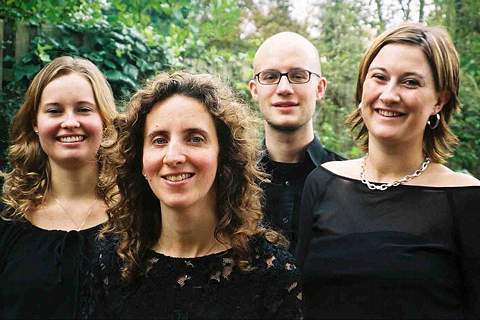|
<< -- 8 -- Roderic Dunnett DESTINED FOR THE TOP

Bach's salary as cantor and teacher was indeed roughly equivalent to the average wage of a mason or metal worker. 'Composers weren't free agents,' Sarah reminds me. 'They were on a payroll, and had to do things that pleased the prince, or the king.'
The main headache for an emergent Early Music group such as this is finances. Keeping the collective fee at a modest enough level to attract first time invitations, while not undervaluing the quality of their work and the players' self-esteem, yet meeting their considerable living and performing expenses, is (as always) a fine-tuned balancing act.
'The existence of budget airlines these days make a huge difference, in both time and flexibility,' Sarah emphasises. 'As well as a base, we've got access to several cars here in the UK, plus a harpsichord -- so we don't have to rent one, and transporting it is cheap.
'That means we can be competitive, especially when we can secure two concerts within a few days of each other. That's something festivals and promoters, who tend to know and deal with each other, can sometimes help with.'

Chris Dury
|
Phoenix Rising is able to bring scintillating programmes like their Leipzig recital to England, and perhaps further afield (the US beckons). By way of proving it, they now have a manager, Christopher Dury. Born in Kent, UK in 1978, Christopher studied violin at Trinity College of Music in London with Oliver Butterworth, and with Kees Koelmans at the Amsterdam Sweelinck Conservatorium.
In London Chris won the Guivier Prize for String Playing and the John Barbirolli Prize for String Quartet. He works as a freelance violinist with, amongst others, Nederlands Reisopera, Nederlands Promenade Orkest and the Helios Ensemble.
Contact details for Christopher Dury and Phoenix Rising are shown on the Phoenix Rising website.
Phoenix Rising are clearly well worth taking notice of. To hear their arresting instrumental quartet alone, let alone catch Dorian Astor singing a plaintive pastorale from Charpentier or Sabine Wüthrich intoning Bach's 'Ich esse mit Freuden', or three of Telemann's feisty arias from Singe-Spiel-und-Generalbass-Ubungen (the glorious 'Die Jugend', enchanting 'Toback'; and splendid Anacreontic 'Die durstige Natur' -- all part of the second half of their 'Bach and his competitors' programme) with four exquisitely well-trained, catchy young Baroque instrumentalists, makes for a glorious, punchy and characterful evening.
Phoenix Rising may not be a household name -- yet. But dazzling keyboard, yearning violin, melting cello and shivering oboe plus alluring recorders alike, they're audibly among Baroque Europe's best. On top form (as they usually are), they can hold an audience -- of all ages -- in the palm of their hand.

Phoenix Rising
|
Arguably they've arrived -- the Phoenix has risen: a sizzling, brilliant and punchy ensemble that shrewd concert promoters should give their right arms to sign up.
| 
